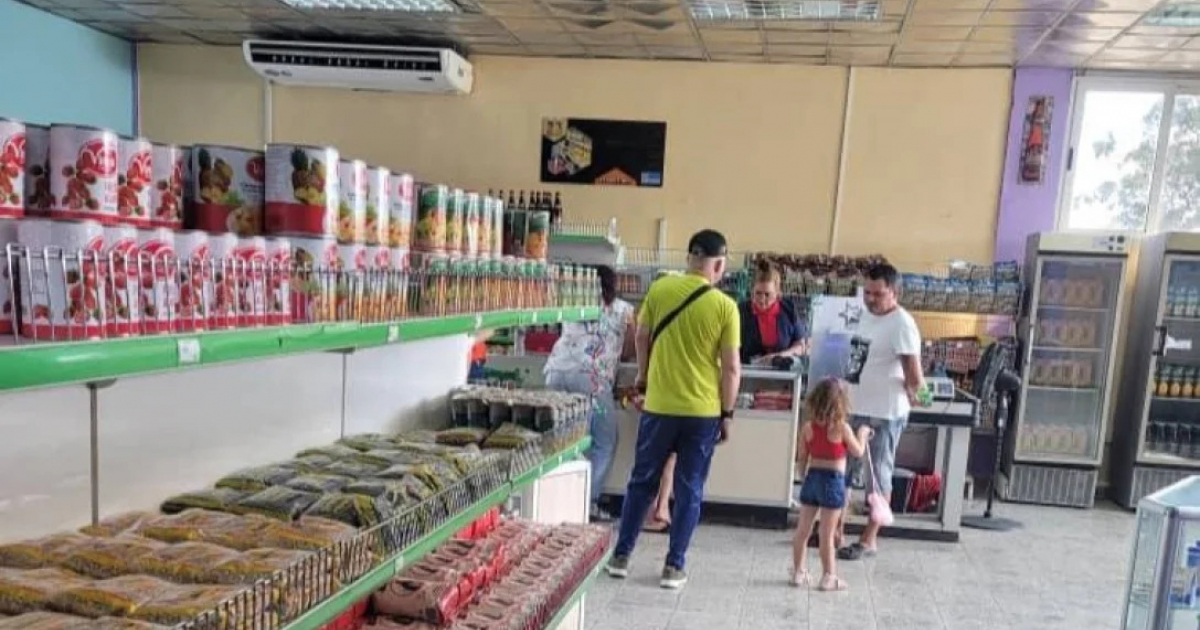
Related videos:
The recent opening of a market in Havana that only accepts cash in dollars or cards linked to foreign currency accounts has stirred significant indignation among the population.
The establishment is located at 3rd and 70, in the Playa municipality, across from the old one that operates in freely convertible currency (MLC). However, unlike that one, it is very well stocked with both national and foreign products.
Inside, there are foods, personal hygiene and cleaning items, household supplies, and appliances; however, the limited payment options deny most users the chance to access these products.
"It’s a complete lack of respect. First, at the MLC, they didn’t accept USD, only euros, and now it’s USD—their store doesn’t accept euros. The one across the street, which is MLC, is completely empty while the new one accepting USD is stocked to the ceiling. Damn, how long is this going to last? Where are they trying to take us?" said a resident of Havana in a post on CiberCuba on Facebook.
"Now the dollar is really going to rise like foam; it's sad for those of us who don't receive dollars. It was the same with the MLC; to buy a ham or pasta sauce, I have to pay whatever the price is. What misery, how much pain and disgust I feel," stated a self-employed worker.
"We have to be bold; they have no food for the people in national currency, yet there is plenty available in dollars. This is for those who refuse to see, to realize where the hell the blockade is. They don't pay us in dollars, and they never will," stated a self-employed worker.
A customer reported that when paying for a purchase, the change at the checkout should be given in USD, but since there are no coins, what actually happens is that "they make up the total amount with cookies or candies."
The supermarket is part of the Gran Muthu Habana Hotel, which opened in 2023 and is managed by the MGM Muthu Hotels chain and the Gaviota group, controlled by the military leadership of the regime.
Payments can be made in cash in dollars, with the Fincimex Classic card, or with a new special card from GAESA's financial division that can be reloaded from abroad.
"I am increasingly surprised; just when you think things can't get any worse, this government finds a way to show you that they can. It is a disrespect to the average Cuban, to those who work for themselves and are paid in a currency that isn’t theirs," a mother commented.
"They are putting the Cuban who left to support the country, it’s that simple," stated a resident in West Palm Beach.
"Our currency is worthless; it shouldn't even exist," noted a resident of Cienfuegos.
"The MLC is the dollar deposited on a card that is already in the bank, and you only have a card with a number. Now, does that dollar of yours, deposited in the bank to buy from that store, have no value? What can we call that? Therefore, the humbler and more in need the people are, forcing emigrated family members to send currency for so many simple necessities, poverty simply becomes a profitable business! Inflation and the loss of value of the national currency that affects workers and retirees only worsens that poverty. The more poverty there is, the more profit!" a man remarked.
The humorist Otto Ortiz coincided with this gentleman, calling the refusal of some stores to accept payments in MLC unjust.
"My question is: Aren't MLCs just dollars that we give to the State? So, what do we do with them? Can private businesses also choose to charge only in those currencies?" she asked.
This new market is a reflection of the dollarization of the Cuban economy, with the regime prioritizing dollar sales at all costs to attract hard currency and attempt to bring order to the national chaos, while the people barely survive with an increasingly devalued Cuban peso.
In December, the government approved a document regulating the "partial dollarization of the economy," as announced by Prime Minister Manuel Marrero Cruz in the National Assembly.
Frequently Asked Questions about the Opening of the Dollar Supermarket in Havana
Why has the opening of the dollar supermarket in Havana sparked outrage?
The opening of the dollar supermarket in Havana has sparked outrage because it restricts access to basic products for those who do not have dollars, a reality for most of the Cuban population who receive their salaries in Cuban pesos. The economic exclusion represented by this new establishment is regarded as a reflection of the growing inequality and dollarization of the Cuban economy, as the Cuban peso continues to devalue.
What is the impact of this supermarket on the Cuban economy?
The dollar supermarket is a reflection of the partial dollarization of the Cuban economy, a process aimed at attracting hard currency while simultaneously exacerbating social inequalities. The lack of access to foreign currency for the population creates an economic segmentation where only those with access to dollars can purchase products, further intensifying the economic and social crisis on the island.
What payment methods are accepted at the new supermarket in Havana?
The supermarket in Havana only accepts cash payments in dollars, with the Clásica card from Fincimex, or with a special GAESA card that has been recharged from abroad. This restriction excludes those who only have national currency or MLC, further limiting access to the products offered in this establishment.
What products can be found at the supermarket on 3rd and 70th?
The supermarket at 3rd and 70 is well stocked with both domestic and foreign products, including deli meats, beers, soft drinks, meats, juices, oils, pastas, cookies, personal hygiene items, cleaning products, and appliances. However, the prices are high and exceed the average monthly salary in Cuban pesos, making them difficult for most of the population to afford.
Filed under: